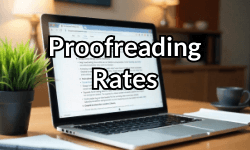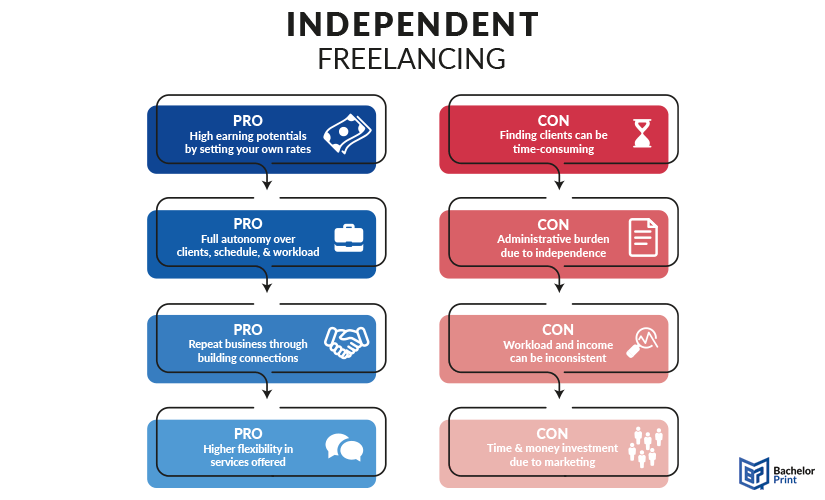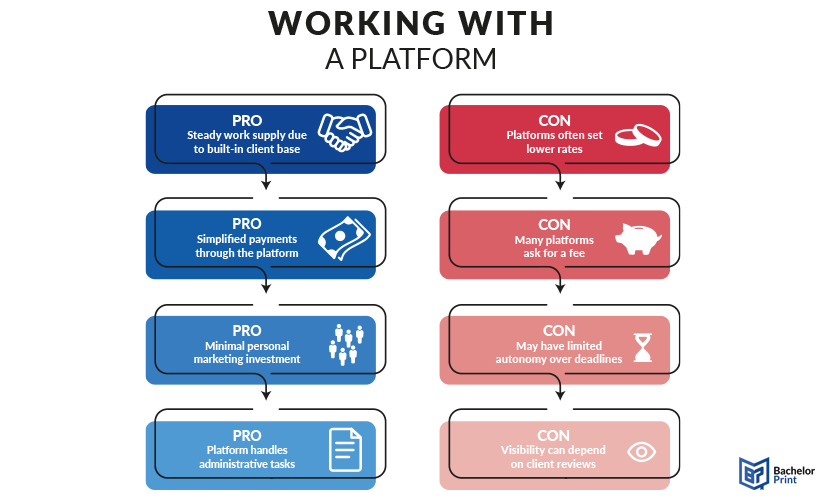
Proofreading ensures that the final text is free from grammatical, typographical, syntactical, and punctuation errors, thereby enhancing its readability and credibility. It’s one of the most popular freelancing jobs. However, it has its challenges since the rates can vary widely. Many struggle to figure out the right amount to ask for from clients. This article will provide some tips and insight into proofreading rates and help you decide the appropriate amount to charge.
Definition: Proofreading rates
Proofreading rates refer to the fees charged for reviewing and correcting written content, ensuring it is free from grammar, formatting, punctuation, and spelling mistakes. These proofreading rates can vary based on several factors, including the type of document (e.g., academic papers, business reports, or manuscripts), the length of the text, and the required turnaround time.
Proofreaders may charge per word, per page, or by the hour. Rates can also differ depending on the proofreader’s experience and whether basic proofreading or more in-depth editing is needed, such as refining tone, style, or technical accuracy. Independent freelancers earn more by directly handling clients, whereas a dependent freelancer must provide additional services, such as marketing and client acquisition.
Proofreading rates per word
Most proofreaders prefer charging their clients per word. Proofreading rates per word usually reflect precisely the amount of work involved. It also encourages service providers to naturally improve their speed because their earnings depend on their speed. The median proofreading rates per word are around $0.015 to $0.10, making proofreading rates per 1,000 words an average cost of around $15 to $100.
Freelancers may charge higher or lower proofreading rates, depending on their expertise, while agencies often have set rates that can be slightly higher. The table below explains the difference between working for a platform or as an independent freelancer in the proofreading business.
| Criteria | Working with a platform | Independent freelancer |
| Clients are provided by the platform. | You need to find your own clients. | |
| Rates | Usually set by the platform, often lower. | You set your own rates, higher potential. |
| Work volume | More consistent; platform may provide steady work. | May fluctuate; dependent on your marketing efforts. |
| Platform handles most or all payment processing and guarantees. | Individually responsible for invoicing and collecting payments. | |
| Admin tasks | Limited; platform manages admin tasks. | Full responsibility for contracts, taxes, etc. |
Proofreading rates per hour
Senior editors and proofreaders with specialized skills or experience frequently charge higher proofreading costs, while newer freelancers or those working on less complex documents may charge on the lower end of the scale. Inexperienced proofreaders may charge hourly rates, basing them on the time they spend reviewing a document. This might not be ideal for clients since there is no maximum on the number of hours, meaning that the prices can add up, leading to possible unnecessary costs. The cost for proofreading rates can be around $30 to $70 per hour, depending on genre, length, and difficulty.
Proofreading rates per page
Proofreading rates per page can vary depending on the editor’s experience, the type of content, and the complexity of the text. A typical page consists of 250 to 300 words, and the cost to proofread it generally ranges from $2.70 to $10.80 per page.
Proofreading rates: Independent vs. platform
As mentioned before, proofreading rates can differ depending on whether you work independently or with a platform. To dive into the elements of each one, we have set them side by side below.
Independent freelancing means that you can set the rates as you wish. However, it also means that you must find clients independently and handle all the communications with them. Being a freelance proofreader naturally means that you must handle all administrative tasks.

There are many proofreading platforms that you can consider. The platforms find the potential clients, handle all administrative duties, and create a community of clients. So, you have the privilege of connecting with clients without handling the heavy load.
Proofreading platforms also provide stability in your work approach. The platforms offer standard editing guidelines and payment terms.

Which factors influence proofreading rates?
Several key factors can substantially impact proofreading rates, ranging from the type of content and the proofreader’s expertise to the project’s urgency and length. Below are the main considerations that influence proofreading pricing:

Experience and expertise
A proofreader’s experience and expertise significantly influence their rates. Proofreaders with years of experience, especially those with a niche focus in fields like legal, technical, or academic writing, are likely to charge more for their quality services due to their specialized knowledge and proven track record. Experienced proofreaders can often catch subtleties that less experienced editors and proofreaders might miss, which justifies their higher fees. On the other hand, newer proofreaders or those just building their portfolio may offer lower rates to attract clients and gain experience. While their rates may be more competitive, they may not yet have the same depth of expertise or ability to handle complex proofreading projects as seasoned professionals.

Document length
The length of a document also impacts proofreading rates, and proofreaders may offer varying pricing structures depending on the total word count or number of pages. For longer documents, such as full-length books, research papers, or reports, proofreaders may offer discounted rates as these larger projects ensure more sustained work over time. Bulk pricing can make longer projects more cost-effective for clients. However, shorter documents, such as emails, website copy, or single articles, may come at a higher per-word or per-page rate because they are quicker jobs but require a similar amount of setup and attention. The length and scope of a project directly impact the rate structure.

Turnaround time
Turnaround time is another important factor in determining proofreading rates. Clients who require fast delivery, such as within a day or even a few hours, should expect to pay premium rates. Rush jobs often nasty that the proofreader has to prioritize the project over other work, sometimes working outside normal hours to meet tight deadlines. Standard projects, with normal delivery times, typically come at a lower rate since they allow the proofreader to manage their timetable more comfortably. The level of urgency can significantly affect pricing, with last-minute projects often commanding rates that are much higher than standard ones.

Depth of proofreading required
The depth of proofreading required also influences the rates. Basic proofreading typically involves checking for surface-level errors such as spelling, grammar, and punctuation mistakes, and it usually comes at a lower cost. However, the rates increase, if the job requires more comprehensive services, such as:
- Checking for style consistency
- Improving readability
- Ensuring proper formatting
Comprehensive proofreading frequently includes light editing tasks like restructuring sentences or ensuring that the tone and flow are appropriate for the intended audience. The more detailed and in-depth the proofreading service quality is, the higher the price, as it requires more time and effort.
Setting your proofreading rates
When determining your proofreading rates, several factors should be considered to ensure that your pricing is both competitive and fair for the level of work you’re providing. Below are some important points to consider.
1. Decide on a pricing structure
While you are free to decide your proofreading rates, the first thing you must consider is the rating style. You can formulate the proofreading rates per word, page, or hour.
| Advantages | Disadvantages | |
| Per word | It effectively reflects the amount of work involved. Earnings will improve with speed. | Not easy for clients to understand unless you quote the price per a specific number of words. |
| Per hour | Quite simple for clients to understand and for you to explain. | Clients cannot predict how much they must pay until the work is done. |
| Per page | Easy for clients to understand. Earnings improve with speed. |
You must format the document consistently. Word count varies per page. |
The “per page” method works well for longer documents like books or dissertations, whereas charging hourly is beneficial when the amount of work required varies from project to project, as with manuscripts. We recommend that freelancers use the per word rating style by charging a certain amount of money per 1,000 words. This makes it easier for clients to know how much they will be paying you.
2. Assess the work with a sample proofread
To provide an estimated price, request an excerpt of the document and conduct a sample proofread. This not only helps you estimate the amount of work involved, but also gives the client a glimpse of your skill and approach. A practical method is to standardize the sample by using a consistent font, size, and standard formatting. After this, proofread a few pages and count the number of edits. By averaging the edits per page, you can determine how labour-intensive the project will be, which allows you to set an appropriate rate. Essentially, the more errors you encounter, the more time and effort will be required, which should be reflected in your proofreading rate.
3. Factor in the deadline
If you offer rush jobs, be sure to charge a premium rate for quick turnaround to reflect the increased demand on your time and effort since clients with tight deadlines may be willing to pay more for your service. Generally, documents of 10,000 words should be done within five days. In contrast, standard rates apply to jobs with flexible deadlines, giving you the opportunity to manage multiple projects without the pressure of a fast delivery.
FAQs
Hourly proofreading rates can vary depending on the qualified editor’s and proofreader’s experience, the niche of the documents, and the length. Typically, rates may vary from $30 to $45 per hour for standard proofreading.
How much you should charge for proofreading depends on factors such as your experience, the complexity of the project, and the deadline. Standard rates usually range between $0.01 to $0.05 per word or $30 to $50 per hour, depending on your expertise and if extensive edits are necessary.
Proofreading rates can be calculated by either per word, per page, or per hour.
An inexperienced editor and proofreader normally charges between $15 and $35 per hour, depending on the type of document and the complexity of the work. As they gain more experience and develop a client base, their rates can increase over time.
